Supply chain to challenge gas-fired plants pipeline
22 August 2023
Bid clarifications are proceeding in earnest for the 7.2GW first gas-fired independent power producer (IPP) projects being procured by Saudi Power Procurement Company (SPPC).
Each of the four developer consortiums has been allocated one day between 21 and 24 August to review the clarification questions. After this, the state offtaker is expected to complete the bid evaluation process and potentially shortlist bidders for the Taiba 1 and 2 and Qassim 1 and 2 IPP contracts.
MEED understands the four developer teams have partnered with the top gas turbine original equipment manufacturers (OEMs) for their bids, namely the US' GE, Germany's Siemens Energy and Japan's Mitsubishi Power.
However, sources close to the project have raised serious concerns regarding the global production capacity for gas turbines.
"There are huge issues," notes a senior executive with one of the leading utility developers in the region. "Each OEM has only limited supplies and the schedule for these projects is very tight."
One Dubai-based OEM executive says their EU-made turbines are booked for several years, but they can still shuffle order deliveries between customers, so they do not expect major delays in delivering to clients.
However, it should be noted that in addition to the Qassim and Taiba IPP projects and the planned PP15 and Al-Khafji power plants in Saudi Arabia, countries such as Kuwait, Qatar and Iraq each have several mega power plant projects in procurement and design stages.
The turbine supply chain problem appears to arise from the decision by some OEMs to reduce capacity over the past few years owing to a combination of the Covid-19 pandemic and the threat of curtailed demand due to the push to decarbonise electricity systems.
The post-Covid-19 recovery, as well as the resurgence of demand for gas-fired power plants in the Middle East and even in some countries in Europe, has meant clients and utility developers will have to consider alternatives, including sourcing turbines from less well-known OEMs such as Italy's Ansaldo, South Korea's Doosan or even China's Shanghai Electric.
Alternatively, clients could be asked to sign off turbines manufactured in the Chinese factories of the top-tier OEMs.
"It's definitely a seller's market right now for turbines. We have capacity in other regions like China, but customers prefer [turbines made in] EU factories," the OEM executive says.
Exclusive from Meed
-
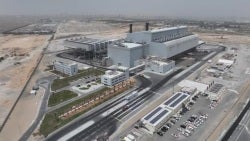 Dubai tenders Warsan waste-to-energy consultancy contract
Dubai tenders Warsan waste-to-energy consultancy contract16 February 2026
-
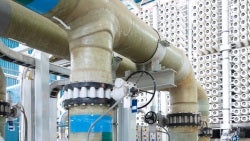 Saudi Arabia wastewater plant reaches financial close
Saudi Arabia wastewater plant reaches financial close16 February 2026
-
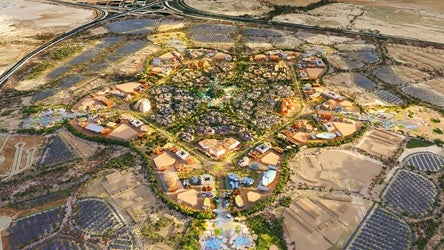 Riyadh tenders Expo 2030 site offices contract
Riyadh tenders Expo 2030 site offices contract16 February 2026
-
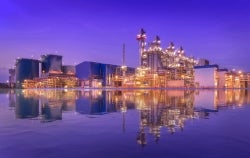 Acwa refinances $2.45bn Hassyan IPP debt
Acwa refinances $2.45bn Hassyan IPP debt16 February 2026
-
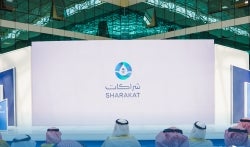 SWPC rebrands as Sharakat to reinforce PPP focus
SWPC rebrands as Sharakat to reinforce PPP focus13 February 2026
All of this is only 1% of what MEED.com has to offer
Subscribe now and unlock all the 153,671 articles on MEED.com
- All the latest news, data, and market intelligence across MENA at your fingerprints
- First-hand updates and inside information on projects, clients and competitors that matter to you
- 20 years' archive of information, data, and news for you to access at your convenience
- Strategize to succeed and minimise risks with timely analysis of current and future market trends

Related Articles
-
 Dubai tenders Warsan waste-to-energy consultancy contract
Dubai tenders Warsan waste-to-energy consultancy contract16 February 2026
Dubai Municipality has issued a tender for consultancy services on the second phase of the Warsan waste-to-energy (WTE) plant.
The tender covers feasibility, procurement and construction supervision services for the project.
The bid submission deadline is 25 February.
The project relates to the planned expansion of the Warsan WTE plant in Dubai. The scheme has an estimated budget of $500m.
The facility will be located in Warsan 2, next to the Al-Aweer sewage treatment plant. As MEED understands, it will use treated wastewater from that facility.
The project scope includes construction of treatment lines, a boiler hall, waste bunkers, a flue gas treatment system, a main electrical station and associated infrastructure.
The contract duration is six years
Expansion strategy
The original Warsan WTE plant, Dubai’s first major WTE public-private partnership (PPP) project, reached full commercial operations in 2024.
Located in the Warsan area, the AED4bn ($1.1bn) facility treats 1.9 million tonnes of municipal solid waste annually, generating up to 220MW of thermal energy that is fed into the local grid.
In February 2023, state utility Dubai Electricity & Water Authority (Dewa) and Dubai Waste Management Company signed the power-purchase agreement (PPA) for the project.
Dubai Waste Management Company, the special-purpose vehicle implementing the scheme, reached financial close in June 2021 for the project.
The main contractor was a consortium of Belgium’s Besix Group and Hitachi Zosen Inova of Switzerland.
The expansion aligns with Dubai’s long-term waste strategy. In February 2022, the emirate approved a AED74.5bn budget covering waste management initiatives from 2021 to 2041.
The strategy promotes innovation in waste management, recycling and energy conservation. It anticipates private sector contributions of AED70.5bn, equivalent to about 95% of the total planned investment.
https://image.digitalinsightresearch.in/uploads/NewsArticle/15660272/main.jpg -
 Saudi Arabia wastewater plant reaches financial close
Saudi Arabia wastewater plant reaches financial close16 February 2026

The planned $500m industrial wastewater treatment plant (IWWTP) in Jubail in Saudi Arabia’s Eastern Province has reached financial close, sources have confirmed to MEED.
Located in Jubail Second Industrial City, the facility will treat and recycle wastewater from Satorp’s under-construction Amiral chemical derivatives complex, also in Jubail.
The project reached financial close after hedging arrangements were completed on 12 February, sources said.
A consortium of Saudi utilities provider Marafiq, the regional business of France’s Veolia and Bahrain/Saudi Arabia-based Lamar Holding is developing the project under a 30-year concession agreement.
Saudi Aramco Total Refining & Petrochemical Company (Satorp), a joint venture of Saudi Aramco and France’s TotalEnergies, awarded the contract last September.
As MEED exclusively reported, Egypt’s Orascom Construction is the engineering, procurement and construction (EPC) contractor for the project, which is expected to be commissioned in 2028.
Marafiq, formally Power & Water Utility Company for Jubail and Yanbu, will own a 40% stake in the dedicated project company. Veolia Middle East will hold a 35% stake, and Lamar Holding’s Lamar Arabia for Energy will hold the other 25%.
The planned IWWTP, which will primarily serve the $11bn sprawling Amiral chemicals zone, will implement advanced water treatment and recovery technologies to process complex industrial effluents, including spent caustic streams. Treated water will be reintegrated into the industrial processes, supporting closed-loop reuse and energy efficiency.
As of February, more than 50% of construction on Satorp’s Amiral facility has been completed. Commissioning is targeted for the end of 2027.
Construction is also ongoing on a separate industrial wastewater treatment plant (IWTP8) in Jubail. Saudi Services for Electro Mechanic Works is the contractor for the development’s fourth expansion phase.
The Marafiq-owned project is scheduled to be completed by the end of the quarter.
https://image.digitalinsightresearch.in/uploads/NewsArticle/15660112/main.jpg -
 Riyadh tenders Expo 2030 site offices contract
Riyadh tenders Expo 2030 site offices contract16 February 2026

Saudi Arabia’s Expo 2030 Riyadh Company (ERC), tasked with delivering the Expo 2030 Riyadh venue, has tendered a contract that includes the construction of site offices required for the initial construction works.
MEED understands that the package was retendered in early February, with a bid submission deadline of 26 February.
The contract was first tendered in May last year, with bids submitted in July, as MEED reported.
The tendering activity follows the Royal Commission for Riyadh City (RCRC) issuing a design-and-build tender for the construction of a new metro station serving the Expo 2030 site.
The new metro station will be located on Line 4 (Yellow Line) of the Riyadh Metro network.
MEED understands that the tender was floated in early February, with a bid submission deadline of 3 May.
Construction work on the Expo 2030 Riyadh site is progressing at an accelerated pace. In January, ERC awarded an estimated SR1bn ($267m) contract to deliver the initial infrastructure works at the site.
The contract was awarded to the local firm Nesma & Partners.
The scope of work covers about 50 kilometres (km) of integrated infrastructure networks, including internal roads and essential utilities such as water, sewage, electrical and communication systems, and electric vehicle charging stations.
Contractors are also bidding for infrastructure lots two and three. In December, MEED reported that ERC had floated another tender for the project’s initial infrastructure works.
The masterplan encompasses an area of 6 square kilometres, making it one of the largest sites designated for a World Expo event. Situated to the north of the Saudi capital, the site will be located near the future King Salman International airport, providing direct access to various landmarks within Riyadh.
Countries participating in Expo 2030 Riyadh will have the option to construct permanent pavilions. This initiative is expected to create opportunities for business and investment growth in the region.
The expo is forecast to attract more than 40 million visitors.
In a statement, the Public Investment Fund said: “During its construction phases, Expo 2030 Riyadh and its legacy are projected to contribute around $64bn to Saudi GDP and generate approximately 171,000 direct and indirect jobs. Once operational, it is expected to contribute approximately $5.6bn to GDP.”
https://image.digitalinsightresearch.in/uploads/NewsArticle/15659580/main.jpg -
 Acwa refinances $2.45bn Hassyan IPP debt
Acwa refinances $2.45bn Hassyan IPP debt16 February 2026
Register for MEED’s 14-day trial access
Saudi Arabia’s Acwa has announced it has refinanced the existing debt facilities of the Hassyan independent power project (IPP) in Dubai.
In a post on social media platform LinkedIn, the developer said the transaction is the largest refinancing it has completed, valued at $2.45bn.
It added that the deal is backed by a new group of lenders. These lenders have yet to be disclosed.
The Hassyan IPP has a generation capacity of 2,400MW and reached full commercial operations in 2023.
The project was originally developed as a coal-fired IPP. It was later converted to operate on natural gas instead, reflecting changes in Dubai’s power generation strategy.
A consortium comprising Acwa – formerly Acwa Power – and China’s Harbin Electric won the contract to develop the project in 2016.
Acwa and Harbin Electric hold 26.95% and 14.7% stakes, respectively, in the project company Hassyan Energy Company. Dubai Electricity & Water Authority (Dewa) holds 51%, while Silk Road Fund owns 7.35%.
The Hassyan plant forms part of Dewa’s wider generation portfolio. Other major assets include the Jebel Ali and Al-Aweer power complexes, Mohammed Bin Rashid Al-Maktoum (MBR) Solar Park and the Hatta hydroelectric project.
MBR Solar Park is the largest single-site solar park in the world, with a planned capacity target of 7,260MW by 2030.
Dewa recently extended the bid deadline for its seventh phase, which will add 2,000MW from photovoltaic solar panels and includes a 1,400MW battery energy storage system with a six-hour capacity.
The new bid submission deadline is 1 May.
https://image.digitalinsightresearch.in/uploads/NewsArticle/15659537/main.jpg -
 SWPC rebrands as Sharakat to reinforce PPP focus
SWPC rebrands as Sharakat to reinforce PPP focus13 February 2026
Register for MEED’s 14-day trial access
Saudi Water Partnership Company (SWPC) has unveiled a new corporate identity as part of a strategy to reinforce the role of public-private partnerships (PPPs).
At a ceremony in Riyadh, the company said it will operate under the name Sharakat, reflecting its “evolution and expanding mandate in the kingdom’s water sector”.
The new identity comes as Saudi Arabia expands the use of PPPs to deliver infrastructure projects.
In January, the government launched a National Privatisation Strategy targeting more than 220 PPP contracts by 2030, including projects in the water sector.
The government is targeting over $64bn (SR240bn) in private capital investments in this period, which it said would be “a new phase focused on execution and accelerating delivery”.
Previously, the 2018 privatisation programme had focused on the ‘foundational phase’.
SWPC has served as the principal offtaker of all water in Saudi Arabia since 2017. Its mandate covers desalinated water, transmission and treatment projects. It also includes small-scale plants, collection networks and strategic water reservoirs.
The total investment value of its current projects exceeds SR56bn ($14.9bn), the offtaker said.
According to MEED Projects, SWPC has over $11bn-worth of PPP projects in the pipeline, with two projects ($2.10bn) currently under bid evaluation.
In December, local firm Vision Invest was named as the preferred bidder to develop and operate the 859-kilometre Riyadh-Qassim independent water transmission pipeline project.
The consortium of Miahona (Saudi Arabia), Marafiq Company and Buhur for Investment was also named as the preferred bidder for the Arana independent sewage treatment plant (ISTP).
Financial close for both projects is expected in 2026.
Meanwhile, SWPC has issued a request for proposals for the $150m Riyadh East ISTP, which will have a treatment capacity of 200,000 cubic metres a day (cm/d), expandable to 400,000 cm/day in the second phase.
The bid submission deadline is 2 April.
https://image.digitalinsightresearch.in/uploads/NewsArticle/15647732/main.jpg



